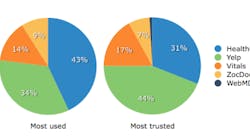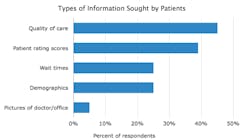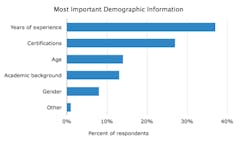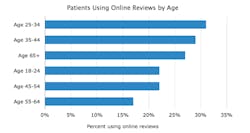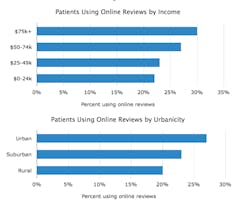The experts at Software Advice, a company that reviews practice management software, spent time analyzing online reviewsand the habits of consumers when it comes to looking for reviews, leaving reviews, what their demographics are, and more. This information could help your practice fine tune your online presence. And here's a tip you've heard numerous times and should take to heart – don't be afraid to ask your loyal patients to write an online review for you. It's worth it's weight in gold.
Some of the key findings are that Healthgrades is the most popular online review site, with 43% of users turning there first, but Yelp is the most trusted, with 34% visiting that site. Patients are most likely to use online reviews as a first step in finding a new doctor.
It's important for dentists to address negative ratings to try to resolve any issues that arise to keep the practice's overall ratings high. Most sites do allow you to publicly respond to negative reviews. It's important to use caution when responding to reviews online becaue patient privacy is a major factor.
What specific information do patients look for? Information about the accuracy of diagnoses is most important. When curating your online reviews, look for comments about the accuracy of your diagnoses. If you find negative commentary, address it.
The most important demographic information for patients is a doctor’s years of experience. The next group ranked certifications as most important, followed by age and academic background. The doctor’s gender came in last in importance to patients.
Administrative information
When it come to administrative details about a practice, patients look for information about wait times and billing or payment issues. Friendliness of office staff, ease of scheduling, and information about the office environment and cleanliness were mentioned as well. What Software Advice's findings suggest is that dentists need to pay attention to office wait times and billing procedures.
One surprising find is how many patients are willing to go out of their insurance network if they find a dentist with amazing reviews. They would rather follow the suggestion of their fellow consumers than their insurance company, a hopeful sign.
The researchers admitted their surprise at how few people research doctors online as opposed to, say, a good dog groomer. With 25% of peopleresearching doctors and dentists, that is still a number that should not be ignored. It's just not as large as health-care professionals would prefer. Not a surprise is that young people seek online reviews more often than older patients.
Males are about 25% more likely to use online reviews than females. Among all patients surveyed, 90% indicate that they don’t leave reviews for their doctors online. If that sample is narrowed to include only the patients who actually use online reviews to research doctors, it is estimated that about 41% of patients who use online reviews also leave them.
Having a strong presence on online review sites can help you attract new patients and retain existing ones. You could offer incentives for patients to leave reviews. You could also ask patients how they found you, and focus on getting those who found you through online reviews to leave reviews for you.
You should also make sure your information is up-to-date on review sites, and work to keep it updated. To minimize the risk of a negative reviews, monitor your patient reviews to address negative feedback.
The learning curve on all of this may take a bit of time and patients and creativity, but it's well worth the effort once you get in the swing of your online presence.
